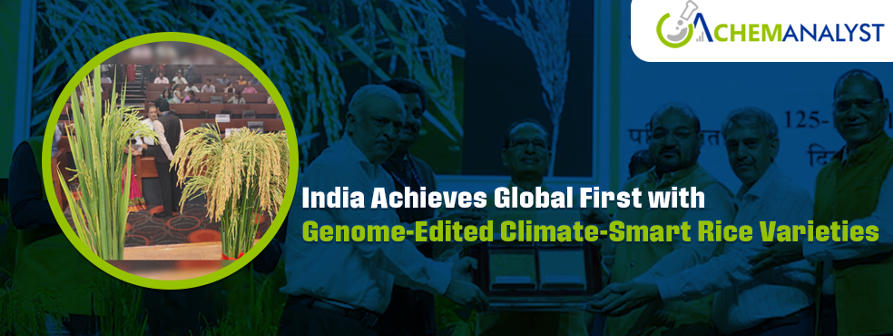Welcome To ChemAnalyst

Indian scientists have etched their name in global agricultural history by developing the world's first rice varieties using cutting-edge "genome editing" technology. These two new climate-smart and climate-resilient paddy varieties were unveiled by Union Agriculture Minister Shivraj Singh Chauhan on May 5. Both promise a significant 25% increase in yield while requiring less water, marking a revolutionary step towards sustainable agriculture.
Developed collaboratively by researchers at the Indian Agricultural Research Institute (IARI), New Delhi, and the Indian Rice Research Institute (IRRI), Hyderabad, these innovative crops are not genetically modified (GM) as they incorporate no foreign DNA. This crucial distinction addresses common concerns surrounding GM foods, paving the way for wider acceptance and adoption.
The Indian Council of Agriculture Research (ICAR) stated that the two genome-edited varieties, named 'DRR Dhan 100 (Kamala)' and 'Pusa DST Rice 1', received necessary bio-safety clearances under India's streamlined regulations for genome-edited crops. ICAR estimates that cultivating these varieties across approximately 5 million hectares could lead to an additional 4.5 million tons of paddy production and a significant 20% reduction (32,000 tons) in greenhouse gas emissions. Furthermore, their shorter cultivation period will save water equivalent to three irrigations, totaling a staggering 7,500 million cubic meters, which can then be allocated to other crops.
Minister Chouhan hailed this achievement as a "classic example of getting both benefits – increased production and environmental conservation." He emphasized that these new varieties will not only boost agricultural output but also contribute positively to the environment by conserving precious water resources and reducing greenhouse gas emissions, thereby alleviating environmental pressure.
Dr. ML Jat, Secretary, Department of Agricultural Research and Director General, ICAR, lauded the development as a "golden day for India's agricultural research," stressing the importance of demand-driven research that directly addresses the needs of farmers.
Dr. C Viswanathan, the lead scientist behind the new rice at IARI, New Delhi, proudly asserted that Indian scientists have created "global history" with this breakthrough. Professor Rajeev Varshney FRS, from Murdoch University, Australia, commended India's dedication to utilizing advanced biotechnology to enhance crop resilience, productivity, and sustainability, ultimately benefiting its farmers.
The development of 'Kamala' and 'Pusa DST Rice 1' involved enhancing two widely cultivated mega rice varieties, "Samba Mahsuri (BPT5204)" and "MTU1010 (Cottondora Sannalu)," using the CRISPR-Cas9 genome editing system. These new varieties retain the desirable grain and cooking qualities of their predecessors while exhibiting improved stress tolerance, enhanced yield, and better climate adaptability. Notably, 'Kamala', derived from Samba Mahsuri, maintains the fine grain quality prized by consumers, according to Dr. Satendra K Mangrauthia, a rice breeder at IIRR, Hyderabad, who contributed to its development.
We use cookies to deliver the best possible experience on our website. To learn more, visit our Privacy Policy. By continuing to use this site or by closing this box, you consent to our use of cookies. More info.
